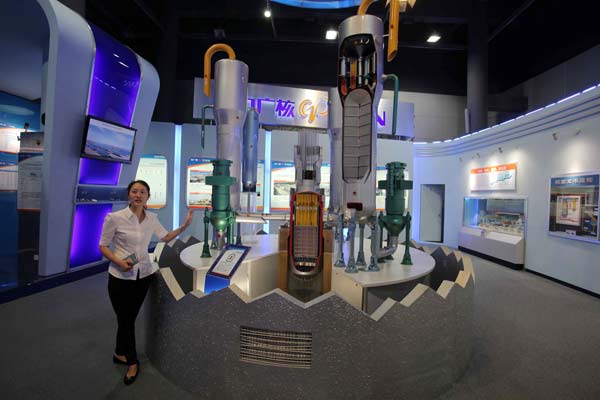China boosts handling of nuke emergencies
Updated: 2013-07-04 01:43
By Zhao Lei (China Daily)
|
|||||||||||
|
 |
|
The exhibition hall of the Daya Bay nuclear power plant. Wang Jing / China Daily |
New plan sets four levels of response and steps for dealing with accidents
China has pledged to strengthen its capability to handle any possible nuclear emergencies, according to a plan approved by the State Council on Tuesday.
The national nuclear emergency plan, based on a previous edition issued in 2005, stipulates the structure and responsibilities of China's nuclear emergency response system.
It sets four levels of emergency response for possible incidents or accidents in civil nuclear stations and lists directions for dealing with accidents that may happen during the transportation of spent nuclear fuel or aerospace vehicles equipped with nuclear devices.
By the end of 2012, China, which began to build its first nuclear power station in 1985, had 17 reactors in operation and 28 more under construction. Nuclear power contributes 1.7 percent of China's electricity consumption, according to the China Atomic Energy Authority, which is in charge of coordinating interministerial efforts on nuclear emergency responses.
Compared with the 2005 edition, the new plan is "more practical and comprehensive in terms of technical preparation, personnel training, logistics and information exchange", said Xu Ping, deputy director of the nuclear emergency response and safety department at the authority.
He said the plan also sets clearer tasks and coordination mechanisms for government departments and companies when a crisis takes place, noting it regulates that accurate information must be published publicly in a timely and transparent manner once an incident or accident occurs.
Since China established its nuclear industry in the 1950s, the government has attached great importance to nuclear safety and emergency response, said Ma Xingrui, vice-minister of industry and information technology and head of the China Atomic Energy Authority.
In 1991, the State Council established a national committee to cope with any nuclear emergencies. Though a host of ministries and departments have been disbanded or merged during governmental structural reforms over the past two decades, the committee remains due to its importance.
"Since last year, President Xi Jinping, Premier Li Keqiang and other top leaders have requested related authorities and companies to enhance their readiness for any nuclear contingency so the safety of the nation's nuclear plants can be guaranteed," Ma said.
Thus far, 16 provinces, autonomous regions and municipalities have established nuclear emergency response committees.
Related Stories
China sets on-grid nuclear power price 2013-07-03 09:08
China reiterates stance on nuclear security 2013-07-02 06:49
Nuclear station starts operation in NE China 2013-06-08 19:10
China's operational nuclear reactors safe 2013-06-04 20:07
China's nuclear projects no harm to public health 2013-06-03 14:45
China targets 20% growth in nuclear power installation 2013-03-12 15:41
Today's Top News
Frankfurt joining race to become key yuan center
Tokyo monitors Chinese fleet
China boosts handling of nuke emergencies
Shanghai nodded for free trade zone
China to strengthen ties with Uganda
Pakistan seeks more investment
China's engagement in Africa welcomed
Hot weather brings wave of health problems
Hot Topics
Lunar probe , China growth forecasts, Emission rules get tougher, China seen through 'colored lens', International board,
Editor's Picks

|

|

|

|

|

|





